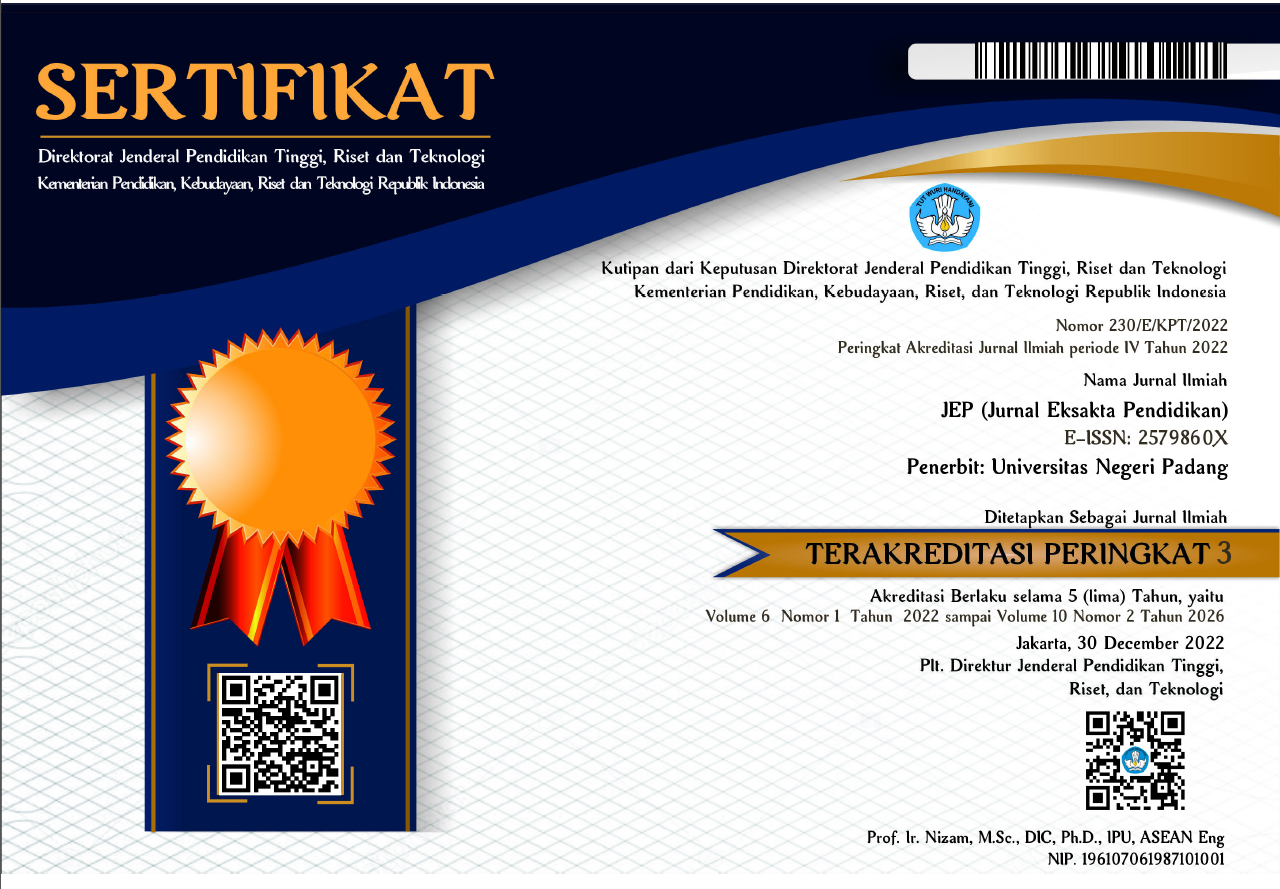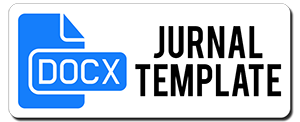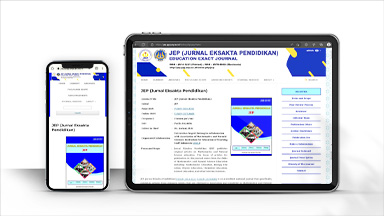Analisis Kebutuhan Pengembangan Instrumen Literasi Lingkungan Untuk Mahasiswa Pendidikan Biologi FKIP Universitas Ahmad Dahlan
Abstract
The decline in environmental quality is a severe problem that occurs in various countries in the world. The decline in environmental quality can occur due to several factors, including habitat degradation (pollution), ecosystem damage, and global climate change. Instilling an attitude of caring for the environment in higher education can be done through Environmental Education materials integrated into several courses or stand as a separate subject. The ultimate goal of Environmental Education is to make students have environmental literacy (environmental literacy). This study aimed to analyze the need for the development of environmental literacy instruments and to develop prototypes of literacy instruments. This research is a type of survey research. The research carries out in May – September 2019 at the Biology Education Study Program, FKIP UAD. Data collection techniques using questionnaires and unstructured interviews with questionnaire data collection instruments. Descriptive data analysis technique. Environmental science courses provide information on current environmental issues that students urgently need. After taking environmental science courses, students feel that environmental literacy has increased, but the level of environmental literacy is not yet known. Students and lecturers feel the need to see the level of environmental literacy, so it is necessary to develop an instrument to measure environmental literacy. The literacy instrument that will develop refers to the NAAEE consisting of four components, namely Competence (identification, analysis, investigation, and solution of environmental problems; knowledge (ecological concepts, environmental concepts, and environmental components); disposition (ideas/ideas, concern), sensitivity. ). , solutions to environmental problems); behavior (commitment to care for the environment and concrete actions to care for the environment).
Downloads
References
Andersen, I., Anderson, M., Antonelli, A., Balvanera, P., Beech, E., Belanger, J., Blanchard, J., & Bohm, M. (2020). Living Planet Report 2020 - Bending the curve of biodiversity loss. In World Wildlife Fund (WWF). WWF International.
BPS. (2018). Laporan Indeks Perilaku Ketidakpedulian Lingkungan Hidup Indonesia 2018. In BPS-RI/BPS-Statistics Indonesia.
Bunga, N. I. (2014). Hubungan Pengetahuan Dan Etika Lingkungan Terhadap Perilaku Peduli Lingkungan Mahasiswa Universitas Kristen Tentena. Jurnal Akademia, 1(2), 51.
Clayton, S., Bexell, S. M., Xu, P., Tang, Y. F., Li, W. J., Chen, L., Clayton, S., Bexell, S. M., Xu, P., Tang, Y. F., Li, W. J., & Chen, L. (2019). Environmental Literacy and Nature Experience. Environmental Education Research, 25(7), 1–14. https://doi.org/ 10.1080/13504622.2019.1569207
Erdogan, M., Marcinkowski, T., & Ok, A. (2009). Content Analysis of Selected Features of K-8 Environmental Education Research Studies in Turkey, 1997–2007. Environmental Education Research, 15(5), 525–548. https://doi.org/10.1080/ 135046 20903085776
Genc, M., & Akilli, M. (2016). Modeling the Relationships Between Subdimensions of Environmental Literacy. https://doi.org/ 10.1080/1533015X.2016.1141724
Haerurahman, M., Rochman, C., & Nasrudin, D. (2017). Profil Literasi Lingkungan Hidup Mahasiswa Prodi Pendidikan Fisika. Seminar Nasional Fisika dan Aplikasinya, 17–21.
Hollweg, K., Taylor, J., Bybee, R., Marcinkowski, T., McBeth, W., & Zoido, P. (2011). Developing a Framework for Assessing Environmental Literacy. In North American Association for Environmental Education.
Hsu, S.-J., & Roth, R. E. (1998). An Assessment of Environmental Literacy and Analysis of Predictors of Responsible Environmental Behaviour Held by Secondary Teachers in the Hualien Area of Taiwan. Environmental Education Research, 4(3), 229–249. https://doi.org/10.1080/1350462980040301
Hsu, S. J., & Roth, R. E. (1996). An Assessment Of Environmental Knowledge and Attitudes Held by Community Leaders In The Hualien Area Of Taiwan. Journal of Environmental Education, 28(1), 24–31. https://doi.org/10.1080/00958964.1996.9942812
Igbokwe, A. B. (2012). Environmental Literacy Assessment: Exploring the Potential for the Assessment of Environmental Education/ Programs in Ontario Schools. International Journal for Cross-Disciplinary Subjects in Education, 3(1), 648–656. https://doi.org/ 10.20533/ijcdse.2042.6364.2012.0091
Kaya, V. H., & Elster, D. (2019). A Critical Consideration of Environmental Literacy: Concepts, Contexts, and Competencies. Sustainability (Switzerland), 11(6). https://doi.org/10.3390/su11061581
Kubiatko, M. (2014). The Environmental Literacy of Lower Secondary School Pupils, High School and College Students. Journal of Environmental Science and Engineering Technology, 2, 2–8.
Liang, S. W., Fang, W. T., Yeh, S. C., Liu, S. Y., Tsai, H. M., Chou, J. Y., & Ng, E. (2018). A Nationwide Survey Evaluating the Environmental Literacy Of Undergraduate Students in Taiwan. Sustainability (Switzerland), 10(6), 1–21. https://doi.org/ 10.3390/su10061730
Maknun, J., Barliana, M. S., & Cahyani, D. (2016). The Level of Environmental Literacy Toward Vocational High School Students in West Java Province. Innovation of Vocational Technology Education, 12(2), 66–70. https://doi.org/10.17509/invotec.v12i2.6205
McBride, B. ., Brewer, C. A., Berkowitz, A. R., & Borrie, W. T. (2013). Environmental Literacy, Ecological Literacy, Ecoliteracy: What Do We Mean and How Did We Get Here? Ecosphere, 4(5), 1–20. https://doi.org/10.3238/arztebl.2012.0340a
Saribas, D. (2015). Investigating The Relationship between Pre-Service Teachers’ Scientific Literacy, Environmental Literacy and Life-Long Learning Tendency. Science Education International, 26(1), 80–100.
Spinola, H. (2015). Environmental Literacy Comparison Between Students Taught in Eco-Schools and Ordinary Schools in The Madeira Island Region of Portugal. Science Education International, 26(3), 392–413. https://files.eric.ed.gov/fulltext/EJ1074869.pdf
Stapp, W. B. (1969). The Concept of Environmental Education. The Journal of Environmental Education, 1(1), 30–31. https://doi.org/10.1080/00139254.1969.10801479
Stevenson, R. B. (2007). Schooling and Environmental Education: Contradictions In Purpose and Practice. Environmental Education Research, 13(2), 139–153. https://doi.org/10.1080/13504620701295726
Strovas, J. L., Moseley, C., & Arsuffi, T. (2018). Environmental Literacy of Undergraduate College Students: Development of The Environmental Literacy Instrument (ELI). School Science and Mathematics, 118(3–4), 84–92. https://doi.org/10.1111/ssm.12266
Sujana, K., Hariyadi, S., & Purwanto, E. (2018). Hubungan Antara Sikap Dengan Perilaku Peduli Lingkungan Pada Mahasiswa. Jurnal Ecopsy, 5(2), 81. https://doi.org/ 10.20527/ecopsy.v5i2.5026
Tao, Z. (2012). Education Programs on Environment. Procedia Environmental Sciences, 12, 349–353. https://doi.org/ 10.1016/j.proenv.2012.01.288
Teksoz, G., Sahin, E., & Tekkaya-Oztekin, C. (2012). Modeling Environmental Literacy of University Students. Journal of Science Education and Technology, 21(1), 157–166. https://doi.org/10.1007/s10956-011-9294-3
Tuncer, G., Tekkaya, C., Sungur, S., Cakiroglu, J., Ertepinar, H., & Kaplowitz, M. (2009). Assessing Pre-Service Teachers’ Environ mental Literacy In Turkey As A Mean to Develop Teacher Education Programs. International Journal of Educational Development, 29, 426–436. https://doi.org/ 10.1016/j.ijedudev.2008.10.003
UCLG. (2017). Tujuan Pembangunan Berkelanjutan yang perlu Diketahui oleh Pemerintah Daerah. United Cities and Local Goverments Asia-Pasific. http://sdgs indonesia.or.id/index.php/sdgs/item/178-tujuan-pembangunan berkelanjutan
Ulfah, M., Suyanto, S., & Aminatun, T. (2020). The Completeness of Environmental Literacy Aspects Studied In the Articles Published In Several Countries. JPBI ( Jurnal Pendidikan Biologi Indonesia ), 6(1), 75–82. https://doi.org/https:// doi.org/ 10.22219/jpbi.v6i1.10813
UNESCO-UNEP. (1976). The Belgrade Charter: A Global Framework for Environmental Education. 1–9.
UNESCO-UNEP. (1978). Intergovernmental Conference on Environmental Education, Tbilisi, final report (Issue October).
Veisi, H., Lacy, M., Mafakheri, S., & Razaghi, F. (2019). Assessing Environmental Literacy Of University Students: A Case Study of Shahid Beheshti University in Iran. Applied Environmental Education and Communi cation, 0(0), 1–18. https://doi.org/10.1080/ 1533015X.2018.1431163
Copyright (c) 2021 Yahya Hanafi, Nani Aprilia, Arief Abdillah Nurusman, Agung Purwanto, Nadiroh Nadiroh, Setia Budi

This work is licensed under a Creative Commons Attribution 4.0 International License.

This work is licensed under a Creative Commons Attribution 4.0 International License.




_(2579-860X).png)
_(2614-1221)1.png)




